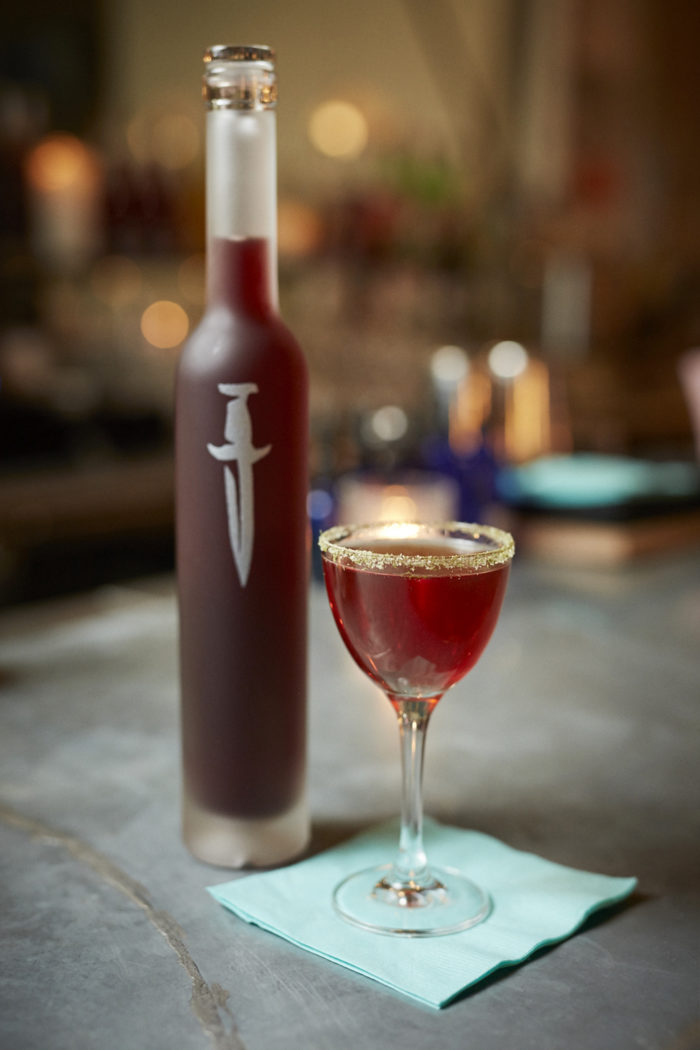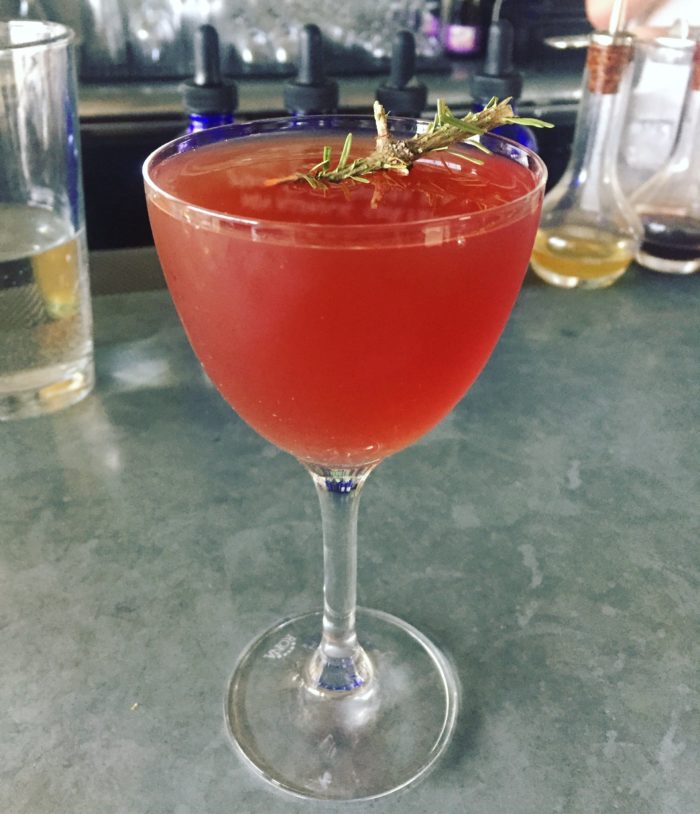It seems fitting that a beverage right out of Game of Thrones would be called Dagger. The richly toned red beverage is a boldly flavored mead, redolent of tart cherry, yarrow, chamomile, and foraged hemlock. Mead is having a moment, if a beverage with a history in many cultures going back to around 6,500 BC can be considered a trendy concoction. Made by fermenting honey, water and yeast with the addition of fruits, flowers and herbs, the ancient beverage shows up in classics like Canterbury Tales and Beowulf. Even the word honeymoon has roots in the mead tradition.
In Brooklyn, always open to reinventing old standards, mead has found a welcoming audience. You can buy a bottle of Dagger ($35) right where it’s made, at Enlightenment Wines, at 93 Scott Ave. in Bushwick. Or try it in a cocktail at Honey’s, the meadery’s tasting room and full bar, open less than a year. “Business has been great. We’ve been happily surprised at how easily meads integrate into a high-quality bar program,” says co-founder Raphael Lyon.
Enlightenment has sold much of its supply to high-end restaurants, including Agern in Manhattan, but new meads are aging in 17 barrels stored in the meadery. Mead-based cocktails are the foundation of Honey’s cocktail menu, with mixologist and business partner Arley Marks, formerly at Mission Chinese, at the helm. “He was excited about what I was doing,” says Lyon, “because I introduced all these new flavors, plants and fruits that he could build cocktails out of.” Lyon said. The Dagger is very fragrant, strong. We drink it straight, and we also make a Martinez,” a kind of cross between a Manhattan and a martini. Enlightenment is brewing other spirits as well, including a dandelion wine. “It’s a bitter, drunk as a tonic in New England,” says Lyon. “It makes a great brunch spritz.”
The Mead Movement
Enlightenment Wines will not remain the only mead stronghold in Brooklyn for long. This summer, former child actor Dylan Sprouse is set to open his All-Wise Meadery in the commercial space attached to the William Vale Hotel. More than a handful of Brooklyn bars have started featuring meads on their menu, including Radegast Hall & Biergarten, Humboldt & Jackson and Tørst. Among those, BÚÐIN, a Greenpoint cafe and bar specializing in Scandinavian fare, offers “Viking Blod” a Danish mead with hibiscus notes, a popular item introduced around Valentine’s Day. “I think it has to do with its rarity honestly,” said manager Stephen Knoll, “and people have come to learn that we are one of the only shops in the area who carry Nordic style beverages.”

Dagger, a variety of mead from Enlightenment Wines
The reintroduction of mead, which has an alcohol content in the range of wine or strong ale, was a natural progression from craft beer and, more recently, hard cider. In 2010, brewmaster Garrett Oliver of Brooklyn Brewery concocted the “Buzz Bomb,” a braggot, which is a drink made with fermented honey and barley malt. “I love the idea of resurrecting a drink that was once common, but fell out of favor for no particularly good reason,” he said.
Brooklyn-based brewer and author Mary Izett, who owns Cuzett Libations with her husband Chris Cuzme, got enthused about mead fermentation after coming across “short mead kits,” which provide ingredients for making sparkling and refreshing beverages with low alcohol content. “I derive inspiration from the culinary world, cocktail lists and other places and my meads are definitely flavor driven,” she said. Her latest? A blueberry-pancake short mead.
Fellow brewer Flint Whistler, formerly at Rockaway Brewery, became fascinated with mead making because it was hard to come by and quite expensive. “At Rockaway I started a home-brew Thursday tradition and mead was an easy, fast-to-brew way to add some variety,” Whistler said. It started when a customer mentioned having beehives in Manhattan, which led to a honey supply and research into historical recipes. As a passion project, Whistler is currently aging a bilbemel (blueberry mead), a cyser (apple mead), and a sima, a low-alcohol mead seasoned with lemon.
Low-alcohol beverages have a following as well. Enlightenment Wines has started making rye kvass, which has only .5% to 1% alcohol. “There are lots of people who want to hang out at bars and not drink alcohol,” said Lyon. “They don’t mind paying as long as it’s something just as interesting, and they don’t want a soda. They don’t like sweet stuff.”
Careful About Sweetness
Sweetness is a characteristic that contemporary mead makers are cautious about. The current mead-consuming demographic is young and with a sophisticated palate, leaning towards drier products. Sugar has always been a decoy to cover up mediocre ingredients and to make an unpleasant flavor more palatable, both in grape wines and in mead. “I do like some meads, but they often need some acidity to counterbalance the overall sweetness, even if they’re technically dry,” said brewmaster Oliver. “Some honeys, though, contain their own acids and can work well.”

A Martinez cocktail (Photo by Angelica Frey)
Mead makers tend to favor natural and seasonal flavors, which mead tends to accommodate. As with wine, mead is tied to the idea of terroir: the soil, weather, and other natural phenomena that affect the taste of honey. Specific herbs, fruits and flowers grow at all latitudes and climates. “The terroir of mead, for us, is what’s growing in the Hudson Valley: it’s dandelions, elderberries, cherries, great apples, and all those interesting plants,” Lyon said. “If I were to go to California, I would use lemons, oranges and desert plants.”
Mead has another attractive feature: it’s gluten-free, making it an option for those who cannot drink beer for health reasons. Nor does it contain sulphites or tannins, which make it hard for some people to tolerate red wine.
Given the richness of the craft and its history, mead aficionados have begun offering classes and tours. Izett and Cuzme host Fuhmentaboudit on Heritage Radio Network, while Lyon leads foraging field trips and workshops that range from notions on fermentation, which he likens to tending to a garden, to herbal lore. “Herbalism and medicine have always been closely aligned to alcohol throughout history, it’s only recently that they’ve been separated from winemaking,” he said. “The same is true for rituals and magic.”